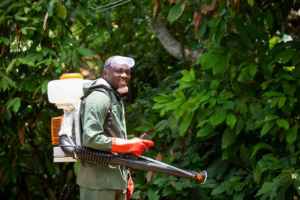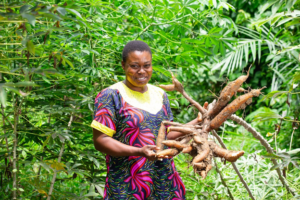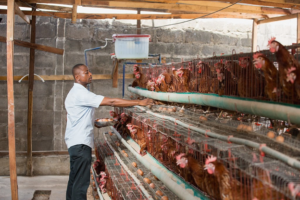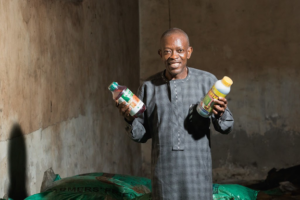Rising Above COVID-19: Farmers’ Resilience, Successes Amidst Pandemic In Niger Delta
Different categories of farmers survived the harsh effect of COVID-19 using different strategies across Nigeria’s Niger Delta region.

As COVID-19 restrictions hindered the movement of farm inputs, leading to an increase in logistics and transactional costs, one cocoa farmer in Ondo State, Southwest Nigeria became a farm service provider (FSP) —a class of service providers who provide sector-expert technical services— for the critical services needed by smallholder farmers.
Cocoa farmers depend on crop protection products; herbicides, pesticides, fertilizers, fungicides, and technologies for pruning trees, spraying, and weeding. These are all supplied by input companies, farm service providers, and technology promoters. But the restrictions on movement in the wake of the COVID-19 pandemic led to a shortage or lack of these services, with farmers spending up to five per cent to eight per cent higher for production.
To help cocoa farmers, Anthony Akinmade, a farmer and agro-dealer who is now an FSP, used phone calls and short messaging service (SMS) platforms to reach farmers, facilitating the delivery of inputs to farmers in distant communities.

This was accomplished through a partnership with retailers and input companies who provided farm services training and sold retailed inputs to cocoa farmers. The small group training centred on agronomic practices, post-harvest practices, and new technologies. This helped cocoa farmers remain in business while also facilitating new business opportunities and income for the FSPs and input companies.
Growing Resilience
Beyond the grim impacts of COVID-19 in Nigeria and the near-collapse of all systems including economy and security, Niger Deltans in South-south Nigeria, have a more inspirational tale due to a combination of factors galvanised by the Foundation for Partnership Initiatives in the Niger Delta (PIND). Continuous training of service providers with diverse competencies and skills over the years to offer different services to farmers and MSMEs as well as continued onboarding of service providers that increased the number available to serve farmers and MSMEs are parts of the causative success factors.
Across the Niger Delta, it is easy to come across participants of PIND’s market development projects targeted at poverty alleviation. The programs span across aquaculture, cocoa production, palm oil production, cassava farming, poultry rearing, while also pioneering funding innovations for small scale farmers and small and medium scale enterprises. For the year 2020, the Foundation targeted N6.3billion additional combined income for farmers and MSMEs, but the net combined income grew to N11.4 billion when the year ended. A total of 9,813 new full-time jobs were facilitated in the agriculture, agro-allied, and clean energy sectors as against the targets of 4,100.
Through its peace building programme, there are already 9,610 self-identifying peace actors facilitated through the Partners for Peace (P4P) Network, with their capacity strengthened to tackle conflict in the Niger Delta. P4P has mitigated 860 emerging conflicts in their communities.
Akinmade is one of the 59,710 farmers and small scale business owners reached recently by PIND with information on good agricultural and climate-smart technologies. In 2020, while COVID-19 ravaged, a total of 10,988 cocoa farmers and MSMEs were reached by FSPs like Akinmade with adaptive services that helped alleviate their most significant COVID-19 induced challenge; access to inputs and labour.
“PIND has trained us, through Saro Company, on how we can use machines in farming in cocoa, farming in palm oil, and in cassava. We are not using manual things like cutlass and hoe again. They introduced to us this pruner, and other machines like that which are faster than the manual machines,” Akinmade said.
The Foundation in its 2020 Annual report estimates that 7,036 cocoa farmers/processors increased their productivity and sales as a result of accessing the services and adopting the practices learnt and consequently raised their income by an additional N1.3 billion.
But PIND’s 10th year of peacebuilding and economic development in the region was almost truncated by a pandemic that no one expected. Dara Akala, Executive Director of PIND, described the Foundation’s experience in the wake of COVID-19.
“The advent of COVID-19 threatened the progress that we had achieved and stalled new activities, which necessitated new approaches to working and living,” he wrote in the 2020 PIND annual report.
“With your support and collaboration, we quickly adapted our delivery approaches and focused on safety. This helped multi-sector market actors to create a joint market response to the pandemic that lessened negative impacts on poor farmers and businesses.”
Cassava Doctor –taking messages to cassava farmers

COVID-19 restrictions hit cassava farmers and processors severely because they occurred at the peak of the main planting season in the region.
They were unable to access inputs due to intrastate and interstate movement restrictions. Market lockups also made buying and selling their produce difficult as the number of off-takers was reduced.
But a woman known as Cassava Doctor became a saviour. Bari Endurance is popular among locals in her state, Bayelsa, as a farm service provider and a village seed entrepreneur. She has been training other cassava farmers in the state on good agricultural practices. She also sells spray services and agro-input products like fertilisers to them.
When COVID-19 struck early 2020, Endurance, who had undergone capacity building training by PIND, resorted to using phone calls to serve her clients.
She reached between 600 and 700 cassava farmers with training on good agricultural practices.
“As a matter of fact, in my area, they all know me as a Cassava Doctor,” Endurance, who is also an undergraduate, says.
“Any question they have about cassava, they just put me on a phone call and ask: ‘If my farm is going like this, what should I do?’ And I give them the answer. Because of that, I find it very easy to go to those communities for training, too. I believe I have reached up to 600 to 700 cassava farmers with training on good agricultural practices.”
She is better for all her efforts both financially and capacity−her staff increased from just two to five. “From what I know now, after my training, I have the financial confidence in my business—such that if my children are going to school, I don’t need to ask for money or borrow money. It is good to be independent,” Endurance beams with confidence and joy.
PIND says an estimated 17,718 cassava farmers/processors increased their productivity and sales as a result of accessing the services and adopting the practices learnt and consequently raised their income by an additional N 2.7 billion.
Defying the pandemic: The Poultry Business Example

Where there is a will, there is always a way, seems to be the motivation of the actors in the poultry sector in Niger Delta during the COVID-19 outbreak−they amassed N1 billion investment into the sector for improved poultry farming practices while creating 1,001 jobs.
To survive the pandemic problems, poultry farmers in the region turned more to the poultry service providers (PSPs) for help in addressing the challenges of access to essential information and inputs. In response, the poultry service providers tweaked their approaches and adapted their services to enable them to support farmers.
The PSPs secured the waiver for free movement of agro products, which facilitated free movement for the poultry sector to conduct their activities. The exemption enabled the service providers to deliver products (such as vaccines, feeds, and DOCs) to poultry farmers for a fee. They also formed relationships with the input companies and helped them to reach more poultry farmers in more locations with support services.
Others used technology platforms—like phone calls, social media, text messages, WhatsApp, and Zoom—to interact with the poultry farmers to make up for the reduced physical visits and organized training programs for a maximum of 20 farmers to comply with COVID-19 guidelines. The PSPs also provided information to their farmers on how to access the government stimulus packages to reduce the impact on their businesses and, in turn, gained new clients as more farmers turned to them for support in overcoming the pandemic-related issues.
Nzeota Prince Uche, from Abia State, a father of three, is one of such PSPs whose intervention has changed the narrative. “I have been able to train other poultry farmers. So far, I have helped set up four to five farms that are around me, and the farmers are running the business on their own, but I give them advice, and they are seeing improvements,” Uche said.
Through his support and those of others, poultry farmers used social media platforms to advertise and sell their produce, targeted market days to sell their produce, started direct sales around their neighborhoods, and sought out stimulus packages from the government. According to PIND, 5,133 poultry farmers and MSMEs were reached during the year 2020 by poultry service providers with training on good practices, linkages to inputs, market, and funding—which were the sector’s most significant business challenges caused by the pandemic.
Surviving the COVID-19 threat: The palm-oil sector

When other sectors were struggling to stay afloat, the palm-oil value chain in the Niger Delta region−consisting of farmers, processors and agro-chemical dealers− held its ground.
In the region, the COVID-19 crisis limited processors’ access to the market, as they could not deliver products to off-takers and big traders due to transportation hikes. Processors had to sell in makeshift local markets within their communities. This led to a drop in palm-oil prices, the shrinkage of cash flows, and difficulty getting working capital from banks. They also faced an increase in the cost of labour and the cost of milling. Palm oil farmers suffered a 36 per cent to 43 per cent increase in the price of fertilizers and had difficulty accessing services.
As a way out, agro-dealers and FSPs worked collaboratively amongst themselves and with palm oil farmers and processors to create a win-win for all actors in the sector. The relationship between these service providers played a crucial role in ensuring access to inputs for palm-oil farmers to use on their farms. This helped to improve their productivity and yield as well as pricing information for informed sales decisions. And fabricators ensured the millers’ equipment was in working order. This ensured the continued availability of palm oil for sales and income for the farmers and processors.
Agro-dealers provided advisory support and information on inputs to farmers via phone calls. They strengthened their relationships with FSPs through socially distanced one-on-one (1-on-1) engagements during the peak of the COVID-19 restrictions. They also held socially distanced physical demonstrations and training for a small group of palm farmers.
“My knowledge is spreading. I have gotten more customers all over the place because I am reaching them out there, going from communities to communities. When you ask of agro-dealers, I think I am the number one in Rivers State,” says Akandu Godwin, an agro-input dealer based in Portharcourt.
“Since I met with PIND in the first place, they have broadened my knowledge. They added value to my business, so it’s not just to tell a customer, “please buy fertilizer.” Now, I can tell them the right fertilizer to buy and the method of application, and those things have increased my output. In fact, it is affecting my business positively because I am selling more products (agro-inputs) now. I am more widely known than before. And why? I am visiting communities, rural areas, all nook and crannies of Rivers State, training and advocating (for best management practices and improved seedlings to palm oil farmers).”
As of December 2020, as much as 13,524 palm oil farmers/processors were reached by FSPs with adaptive services that helped alleviate their most significant COVID-19 induced challenges–access to inputs, labour, funding, information, and markets. A total of N 1.9 billion was leveraged in new investments into the sector from public and private sectors to implement good agricultural practices and technological innovations.
Support Our Journalism
There are millions of ordinary people affected by conflict in Africa whose stories are missing in the mainstream media. HumAngle is determined to tell those challenging and under-reported stories, hoping that the people impacted by these conflicts will find the safety and security they deserve.
To ensure that we continue to provide public service coverage, we have a small favour to ask you. We want you to be part of our journalistic endeavour by contributing a token to us.
Your donation will further promote a robust, free, and independent media.
Donate Here






It’s good to know there is some good news, but not that Nigerian farmers are actively being encouraged to use agro-chemicals and industrial methods. Surely there has to be a breakthrough whereby we realise that Big Ag is one of the reasons why our soils are being depleted and diseases like Covid are spreading. There is a huge disconnect here. Please can we find a better way forward for African farmers. Look at Dirt to Soil by Gabe Brown, a farmer in North Dakota who has turned his land around with permaculture, and made it far more healthy and productive than it was. It just seems blind to encourage the use of fertilisers and pesticides when they are part of the problem.